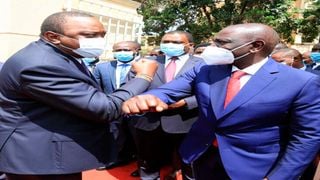
President Uhuru Kenyatta and his deputy William Ruto exchange greetings during 18th Annual National Prayer Breakfast at Parliament Buildings on May 27, 2021.
| Jeff Angote | Nation Media GroupPolitics
Premium
BBI ruling drives last nail in Uhuru Kenyatta, William Ruto split coffin
As the rift between President Uhuru Kenyatta and Deputy President William Ruto widens – a year to the end of their second term – it is apparent that the President might not involve his deputy in any political assignment. Neither is he going to support his candidature.
For almost a year, the DP has been sidelined by State House, and apart from the occasional ceremonial duties during national days, he has been missing out in most presidential functions.
The tone of the widening gulf, which has been apparent, emerged as the President held a conference with senior editors on Monday where he openly wondered why his deputy decided to oppose the government they crafted.
Of late, Dr Ruto has been critical of the government, going to the extent of saying Mr Kenyatta’s pet project, the Big Four Agenda, is a failure.
Asked what transpired, the President said: “I have no idea except for the fact that he is probably trying to create a base for him (self) – and his future, which is his right. I have never denied him that and he is free to do so. It is unfortunate the manner in which he is doing it by going against the same government he is serving. It is wrong.”
The fallout between the DP and his erstwhile friend has been played out in the succession politics and in the recent attempts to amend the Constitution through the Building Bridges Initiative (BBI) – which was brought about by the truce between the Jubilee government and the opposition led by ODM chief Raila Odinga.
While Dr Ruto has been opposed to the BBI, the President thinks Kenyans seem to have forgotten that it was the handshake between him and Mr Odinga that brought about political tranquillity.
“It is unfortunate we have short memories. You can remember the tension that was in the country, the violence in some parts, and the fact that we were in a very uncomfortable situation as a country between both elections – all the way ill January,” the President said.
Crisis erupting
“Upon seeing the possibility of another crisis erupting similar to the 2007 one, I decided that this country does not deserve that. I took it upon myself to reach out to Raila.”
In 2007, Kenya plunged into post-election violence in which Mr Kenyatta and Dr Ruto were charged at the International Criminal Court as the masterminds.
While Mr Kenyatta’s case was dismissed, Dr Ruto’s was vacated when the court felt that witnesses had been compromised.
During the 2007 elections, Mr Kenyatta and Dr Ruto were in different camps. They surprised many by running on a joint ticket in 2013.
“The issues we were trying to achieve through the BBI are what brought me and him together. If divisions of 2007 brought us together, why can’t we bring more on board?” he asked.
For yet another time, President Kenyatta said reaching the handshake was not an easy moment for him and Mr Odinga.
“It was a difficult time…but we were able to talk. We discussed underlying issues that had plagued this country and this led to the handshake,” the President added.
The President said the process was expanded to bring in more leaders “including some of those, unfortunately, who, for short-term political reasons, are opposed to this particular process”.
It was the second time, after the Bomas of Kenya launch, that the President said Dr Ruto was informed.
According to Mr Kenyatta, the main issue that polarises the country is the winner-takes-all.
“What was pertinent to me was that people feel when one side wins; the other side loses. We felt we had to resolve the question of equity and inclusivity,” he said.
Elections
“We then decided to go to the people to hear their issues. Young people had issues. We had all these into a document known as BBI. We said, ‘if we rectify these issues, we will go the elections in the hope that what we have seen in the past will dissipate’.”
They two courts argued that the President has no right to lead a popular initiative and that the verification of the signatures was carried out by the Independent Electoral and Boundaries Commission when it was not properly constituted.
“It is most unfortunate that people have forgotten why we were looking for this and have decided to deny Kenyans what is legitimately in their interest,” President Kenyatta said.
“The court was misguided. Unfortunately, there are politicians who, for short-term interests, are opposed.”
Revisiting the issue of equity – which emerged during the BBI campaigns – the President said he still feels the sharing of the national cake is distorted:





